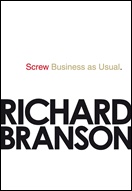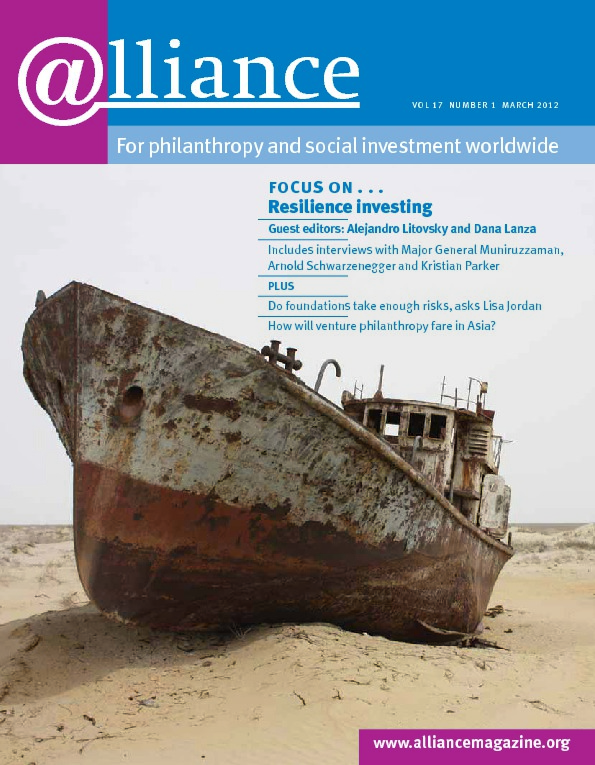 A naked man running into a cactus bush is a pretty good description of what happened to the financial sector in 2008. It is also the misfortune that befell British tycoon Sir Richard Branson – the man who started out selling a student newspaper in the 1960s, went on to sign the Sex Pistols to his record label and now rules a corporate empire of more than 300 businesses – as he fled from his burning mansion on Necker Island in the Caribbean after it was struck by lightning in August 2011. Reflecting on that experience, in the opening pages of his new book Sir Richard tells us that we have an opportunity to build a new capitalism on the ruins of the old, just as he is rebuilding his mansion. ‘Never has there been a more exciting time for all of us,’ he exhorts, ‘to explore this next great frontier where the boundaries between work and higher purpose are merging into one, where doing good really is good for business.’
A naked man running into a cactus bush is a pretty good description of what happened to the financial sector in 2008. It is also the misfortune that befell British tycoon Sir Richard Branson – the man who started out selling a student newspaper in the 1960s, went on to sign the Sex Pistols to his record label and now rules a corporate empire of more than 300 businesses – as he fled from his burning mansion on Necker Island in the Caribbean after it was struck by lightning in August 2011. Reflecting on that experience, in the opening pages of his new book Sir Richard tells us that we have an opportunity to build a new capitalism on the ruins of the old, just as he is rebuilding his mansion. ‘Never has there been a more exciting time for all of us,’ he exhorts, ‘to explore this next great frontier where the boundaries between work and higher purpose are merging into one, where doing good really is good for business.’
Screw Business As Usual is Sir Richard’s attempt to show what life beyond that next great frontier looks like. ‘It’s about revolution,’ he explains, not business as usual. This is not old-style corporate social responsibility or CSR, which he pretty accurately identifies with ‘a small team buried in a basement office’ in most companies. Nor is it a matter of corporate philanthropy. Money is the ‘least important bit’ of the Virgin Group’s do-gooding, he argues. Instead, his companies focus on ‘becoming a true partner for frontline organisations and leveraging absolutely everything we possessed in order to drive change’.
Screw Business As Usual is characterized by the boundless enthusiasm of its author, not just for what Virgin is doing but also for the individuals and organizations that he gets to hang out with. Many of these are familiar: he sings the praises of microfinance pioneer Muhammad Yunus and Jeff Skoll’s purpose-driven movie company Participant Productions, which made Al Gore’s Inconvenient Truth. But he tries to leaven the lump with tittle-tattle from the dinner tables of the rich and famous (the Oscar-winning actress Kate Winslet pops up on the first page). He also name-checks an army of non-celebs from his friends, family, colleagues and people he has met. Though some readers will find the name-dropping tiresome, this personality-based approach to telling stories does reinforce the sense of agreeableness and personal warmth that is so much part of the Branson brand.
Sir Richard talks the talk, but does Virgin walk the walk? The book is littered with examples of how his companies are living out the ‘doing well by doing good’ philosophy. Some of them underwhelm, such as the pages dedicated to telling how he is backing five scholarships for poor South Africans at his alma mater, Stowe school in Sussex. Yet from tackling climate change with his ‘Carbon War Room’ to fixing failed states through ‘The Elders’ (an independent group of some the world’s most revered elder statesmen, including Archbishop Desmond Tutu and former president of Ireland Mary Robinson), Sir Richard can claim to be a leader in corporate philanthrocapitalism. He is at his best when courting controversy, as he did when he criticized former South African president Thabo Mbeki’s ideas about tackling HIV/AIDS. His views on the failed ‘war on drugs’ smack of a genuine radicalism.
Screw Business As Usual is part of a wider intellectual movement, including Michael Porter’s recent work on ‘shared value’ and Jed Emerson’s pioneering of ‘blended value’, which is trying to create a vision for a more sustainable and socially responsible capitalism. But it is not an analytical book. The Virgin corporate motto, he tells us, is ‘Screw it, Let’s do it’. So, rather than mulling over exactly why businesses that are socially and environmentally responsible will do better in the long run than those that chase short-run profits, he simply talks a bit about ‘good karma’ and then throws in another story about someone he likes.
The fact that Sir Richard has wholeheartedly embraced corporate do-gooding and made so much money means we should take him seriously. But Virgin is also very different from most businesses. It is a privately owned company with no shareholders to please, so it can play faster and looser with the bottom line than most others. Could the CEO of a publicly owned company report to shareholders that an initiative like The Elders is a good use of their money? We suspect not. But the idea that capitalism needs to take off the blinkers and think of success in a more holistic and long-term way is one that surely ought to become embedded in corporate boardrooms.
Matthew Bishop and Michael Green are co-authors of Philanthrocapitalism: How giving can save the world and The Road From Ruin: A new capitalism for a big society. Bishop is New York Bureau Chief of The Economist; Green is an independent writer and consultant on philanthropy and development. Emails MatthewBishop@economist.com and shepleygreen@googlemail.com
To order
Screw Business As Usual
Richard Branson Penguin Portfolio $26.95/£12.99
ISBN 9780753539798





Comments (0)